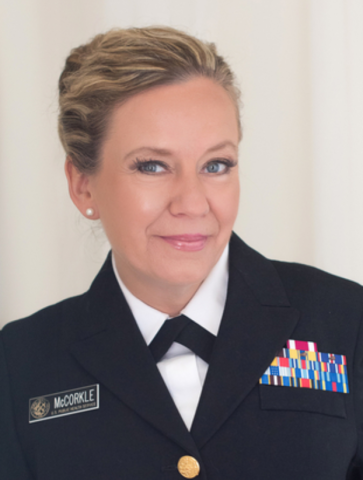Alumna Finds Fulfillment in Military Social Work and Public Health Service Career

Jenny McCorkle grew up in Indiana with a family legacy in teaching. She went to Ball State University with the intention of following this path laid out for her. “I was in an advanced student teaching program, which gave me the opportunity to realize that I did not enjoy facing a classroom of 25 to 30 young children at eight each morning,” she recalled.
After some soul-searching, she concluded that she still wanted to help people who were struggling and that as a social worker, she could work one-on-one with people while keeping some components of her love for teaching. While pursuing her BSW, she worked with a social work professor who earned her MSW degree at Florida State, inspiring Jenny to leave her home state for Florida.
After working three years with an agency that supports people with disabilities needing extra support and job training, Jenny knew it was time to make the leap. “I applied and cried happy tears while reading my acceptance letter—yes, I still have the 1995 letter,” she recollected. “With my cat in her carrier next to me in a U-Haul, I headed south to Tallahassee, envisioning weekends in the sun and sand.”
Alongside the sunshine, Jenny’s schedule was filled with a full graduate course load while also working full-time at a community mental health center. After completing her MSW coursework in 1998, she stayed on in Florida, working at an inpatient behavioral health program for teenage boys in Bradenton while completing her social work licensure. A colleague who had served as an Army nurse introduced her to another career opportunity.
“I had never considered going into military social work, and I had absolutely no awareness that there were social workers in the military,” she shared. But up for an adventure, Jenny completed the medical clearance, FBI background investigation, Congressional approval for commissioning, and completed officer training as a U.S. Air Force Captain in 2003.
Initially assigned as a family advocacy officer, Capt. McCorkle found herself leading the family maltreatment program at an Air Force installation where she faced challenges that were very different from the civilian sector. “As a new military social worker, I quickly realized that patient confidentiality is viewed very differently in the military. Some mental health or behavioral issues that patients may demonstrate can contribute to safety issues and/or violations of national security,” she explained. “In such situations, specific information is to be discussed with the patient’s commander so that appropriate measures, such as temporary removal from a duty, can be taken to ensure the safety of the mission. This was a difficult adjustment for me.”
As an active-duty social worker, Capt. McCorkle also knew that deployments would happen. She was deployed twice to an Air Force base in a vast desert area in the United Arab Emirates, where her duties transitioned to providing mental health services and tobacco cessation psychoeducation. During her second deployment, she learned about a branch of service called the Commissioned Corps of the U.S. Public Health Service (PHS). This branch has approximately 6,500 members, all commissioned officers whose mission is to protect, promote, and advance the health and safety of the nation; about 200 of these officers are social workers.
After seven years with the Air Force, she decided to transition to the U.S. Public Health Service. Because PHS social workers played a big role at this time in supporting ongoing mental health needs in the Department of Defense, Commander (CDR) McCorkle served assignments at Naval Medical Center Portsmouth and Joint Base Langley-Eustis, both in Virginia, and at Seymour Johnson Air Force Base in North Carolina.
One of the biggest differences for PHS officers is that deployments last a few weeks and they are to natural or man-made disasters rather than several months near active combat. CDR McCorkle was deployed to Texas to support FEMA workers after back-to-back hurricanes and again during the pandemic to support the mental health of her fellow PHS officers.
Another difference for PHS officers is that they can be assigned to work at the Department of Health and Human Services agencies. She recalls a deep appreciation for her 6-year assignment in which she worked as a mental health provider with the Indian Health Service at a remote clinic on the Navajo reservation in Arizona. She enjoyed being immersed in the numerous aspects of a different culture, including language, food, clothing, spirituality, and family dynamics.
As a non-Native, the biggest challenge was to establish trust in a population 99% Navajo. She stressed the importance of maintaining a professional, patient presence paired with a non-confrontational manner and a willingness to learn and honor Navajo traditions and beliefs. She acknowledges that in her work in Native communities, she witnessed firsthand the impact of historical trauma and the resulting skepticism and mistrust toward medical and governmental systems.
“While I ended up traveling a road that I would’ve never imagined for myself, the education I received at the College of Social Work has been the foundation for the 20+ years of military and public health service I’ve been honored to provide and the adventures I’ve experienced along the way,” concluded CDR McCorkle.

